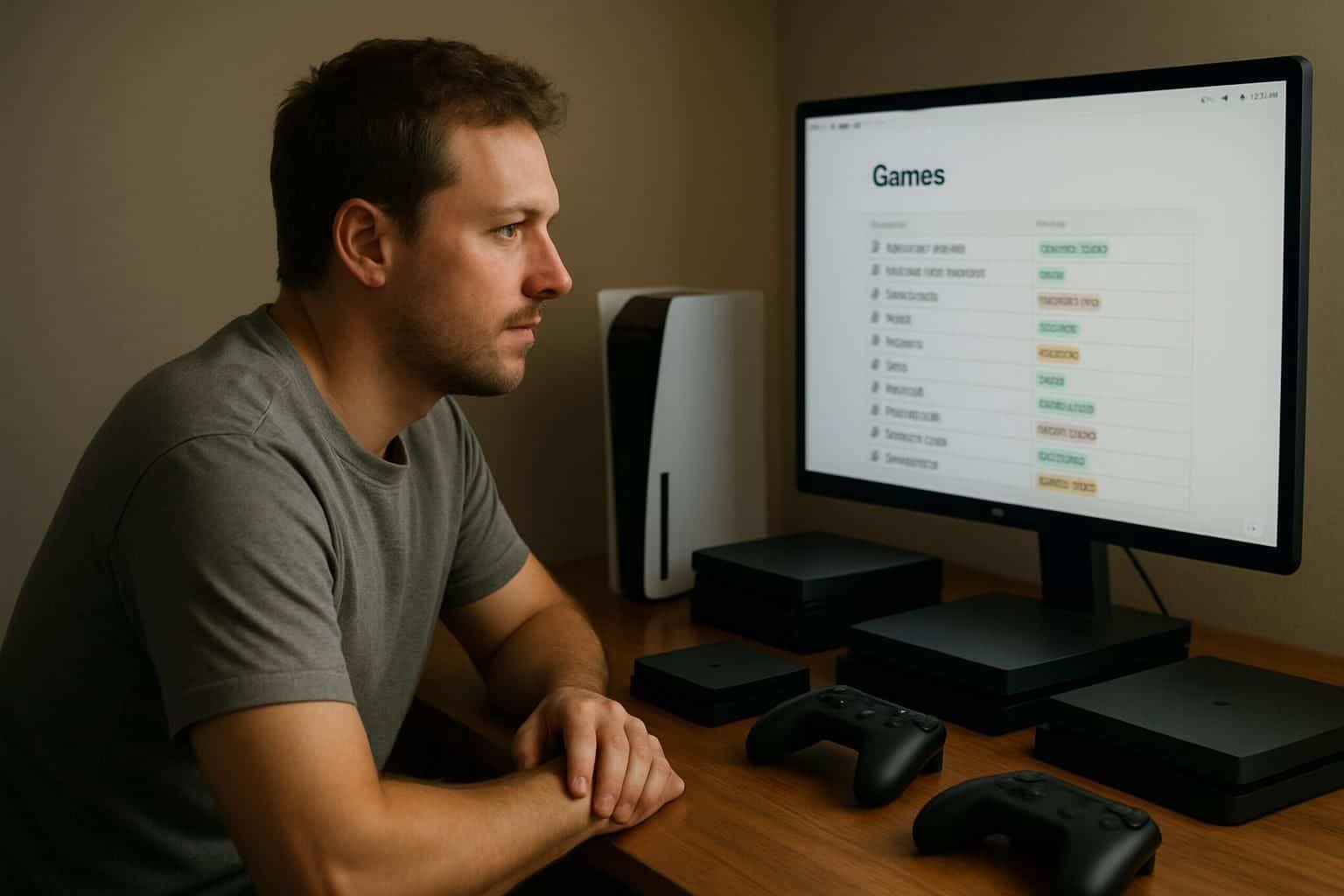Are you staring at your game library, unsure how to decide what game to play next? Many gamers choose titles based on mood, friend recommendations, or current popular releases like story-driven games or multiplayer games.
This blog will give you 10 simple tips to match your gaming mood and fun level for a better pick from retro games to gun games. Read on for smarter ways to find the right game today.
Key Takeaways
Pick games based on your mood, energy levels, and free time available to best enjoy casual or intense play sessions. For example, short rounds of “Rocket League” suit quick breaks, while deeper immersion in “Civilization V” is great for longer play.
Check with friends or gaming communities online through platforms like Reddit, Discord groups, Twitch streams and YouTube gameplay videos before picking a new game. Popular review sites including IGN and Metacritic also offer helpful ratings.
Organize your existing library clearly by genre such as RPGs (“Mass Effect,” “The Witcher”), simulation titles (“Sim City,” “The Sims”) or action hits like “Doom Eternal.” Updating collections helps rediscover unfinished gems plus newly-added content updates (e.g., multiplayer mode in Stardew Valley).
Free demos let you test out unfamiliar genres risk-free; “Just Cause 2” proved popular with two million demo downloads leading to six million sales. Platforms such as Steam, Xbox Live and Epic Games regularly provide these trials.
Gaming trends will evolve sharply toward cloud services (Xbox Cloud Gaming), augmented reality experiences (“Pokémon Go”), and smarter AI characters by 2025—adding variety to how gamers choose what they play next.
Table of Contents
Assess Your Mood and Interests

Understanding your mood helps you choose the best gaming genre and difficulty level. Checking how you feel guides whether you’ll relax with “Lost Odyssey,” enjoy casual games on Steam, or spend time battling in gacha games.
Consider your current energy level

Your current energy level can shape your game preferences. ParrytheDonut, for example, picks games based on mood and chooses lighter games after tiring days. Harder or competitive game genres like intense battles in ‘Lost Odyssey’ or grinding levels in a gacha game may need more mental strength than you have left after school or work.
Lighter titles often use less of your energy but still let you enjoy playing. Casual puzzle games from Steam, easy-going emulation classics, or fun yet simple adventures suit lower-energy moods better.
Games that excite you and hold your attention need more mental effort and higher energy expenditure—so save tougher content for times when you’re well-rested and alert.
Reflect on the genres you enjoy

Your energy level can guide your choice, but also consider your favorite game genres to boost the fun factor. RPGs offer many paths, from online adventures in MMORPGs like “World of Warcraft” to intense Roguelikes such as “Hades,” known for their varied game difficulty and replay value.
I love RPG games that let my choices affect the story—games like “The Witcher 3” or those from the “Mass Effect” series provide rich experiences by allowing me different endings based on decisions made along the way.
Simulation, crafting, and building games give another kind of joy entirely; making cities grow in classics like “Sim City,” guiding virtual lives in “The Sims,” or managing parks in old favorites such as “Theme Park.” Even some casino-style online games use engaging features similar to rewarding mini-games found within video game mechanics—for example, casinos often attract players through features like bonus rounds or progressive jackpots.
Pride Kazunga, an expert on iGaming, mentioned that a matching deposit by 100% gives new players double funds right away—that means more chances to play longer sessions and explore deeper gameplay elements.
Identify Your Goals for Gaming

Figuring out why you play—whether to chill in an open-world adventure or level up your rank on multiplayer platforms like Steam—makes choosing games simpler. Your gaming goals drive the picks that best match your style, mood, and idea of fun.
Relaxation and casual fun

Casual games offer geeks an easy way to unwind and enjoy brief gaming breaks. They are simple, quick to play, and accessible on phones or tablets at any time. Popular choices like Candy Crush Saga and Angry Birds take just minutes per session, fitting easily into a busy day while helping players relax.
Social casual games such as Words With Friends or Among Us boost emotional health by connecting players with friends online for some friendly competition. Exergaming options like Ring Fit Adventure combine physical activity with gameplay, keeping users relaxed yet active in a fun-filled way.
Selecting the right casual game can help you refresh your mind before moving on to competitive play and building your skills.
Play gives children a chance to practice what they are learning. – Fred Rogers
Competitive play and skill improvement
While casual gaming offers relaxation, competitive play demands constant practice and clear goals. Regular training helps gamers sharpen reaction times, build strategies, and boost performance in games like Valorant or League of Legends.
Tracking your stats with tools such as Blitz.gg can highlight strengths and areas to improve. Investing in quality gear—like responsive keyboards, precise mice (Logitech G Pro Wireless), or clear headsets (HyperX Cloud)—gives you an extra edge over rivals online.
Setting realistic skill targets keeps motivation high and ensures steady progress toward mastering competitive titles.
Immersive storytelling and exploration
Immersive storytelling and exploration grab gamers who love stories with deep meaning and real impact. Geeks often pick RPGs that offer branching plotlines, various endings, and tough choices—games like “Mass Effect” or “The Witcher.” Visual novel games like otome titles also pull fans into detailed stories rich with emotion, relationships, and outcomes they carefully shape.
Popular examples include “Shining Nikki” or idol-focused games like “Idolm@ster.”.
Exploration lets players step off the path to discover hidden lore, secret side quests, or easter eggs placed by creators. Open-world hits such as “Skyrim,” or adventure classics like Zelda’s latest entry reward curious minds in big ways.
Players may plan a game session ahead of time but often act spontaneously on impulse instead; maybe that’s part of what makes discovering these worlds so exciting for all different types of gamers.
Evaluate Your Available Time

Glance at your clock—can you fit in a quick Fortnite match, or settle into an evening of Elden Ring? Time shapes your game choice more than you think, so keep it real about how much you have.
Short play sessions
Short game sessions of an hour or two can boost your gaming fun. Many gamers enjoy quick rounds in games like Rocket League or Fortnite to keep engagement high and excitement fresh.
Short bursts, around 30 minutes at a time, also spark lively talks with friends afterward about epic wins or funny fails. Gaming expert ScottM points out that matching play session length to the game’s style matters for best results.
Still, some days call for more than just short sessions; they invite long gaming marathons—let’s talk next about how to prepare for extended playtime.
Long gaming marathons
Long gaming marathons can be a great way to dive deep into games like Civilization V. Playing on marathon mode, tech research and building projects take much longer, adding extra layers of challenge.
I once played Civilization V for 10 hours straight on this setting—balancing resources, planning city growth, and racing rivals required clear focus and smart strategy. Breaks for snacks or water help keep your mind sharp during these long sessions.
Sharing insights with other gamers in online forums can offer fresh strategies if you get stuck or lose steam mid-game.
Next up is exploring what’s already waiting in your game library—a treasure trove full of untapped fun!
Explore Your Game Library

Open your Steam collection, Xbox dashboard, or PlayStation menu to spot games you’ve overlooked. Sort titles by recent updates or expansions to discover fresh content waiting for you.
Revisit unplayed or unfinished games
Your game library likely holds a few hidden gems you haven’t played fully yet. These unfinished games aren’t failures but useful tools for learning about your gaming style. For example, looking at my abandoned Skyrim playthrough taught me that open-world RPG titles need more time than I often have to spare on weekdays.
Checking out these unfinished titles can help spot patterns in what grabs or loses your interest, showing themes and gameplay styles you enjoy most. Sort your Steam or Epic Games files into clear groups by genre or mood to make it easy to pick up an older game again.
Organizing saves clearly means no frustration when loading back in after months of absence, saving effort and easing the return process greatly.
Check for updates or new content in games you own
Game developers often release special events, expansions, or bug fixes after launch. These updates can breathe new life into games you have played a lot before. For example, Stardew Valley added major content like multiplayer mode and additional quests years after release.
Platforms like Steam show update news clearly in the library section. Tools such as GOG Galaxy help combine libraries from various platforms into one organized place using tags. This makes it easy to track changes to owned titles without switching between apps.
New game updates are hidden gems waiting patiently in your own backyard.
Seek Recommendations and Reviews

Hop onto Reddit or Discord to check out what gamers are playing now. Twitch streams and YouTube reviews offer quick insight into games worth your time.
Ask friends or online communities
Copanele always chats with gamer friends before deciding what to download next. Friends who’ve played games you’re curious about can offer useful tips, honest opinions, and fun insights that online ratings might miss.
You could also post on forums or Twitter and Reddit groups for gamers; as of February 2021, there were hundreds of gaming-related communities and discussions online covering over 263 topics.
Joining these talks helps build bonds with friendly players through things like sharing jokes, showing gratitude after good game suggestions, or swapping stories from your in-game adventures.
Read reviews or watch gameplay videos
After talking with friends or online gaming groups, it’s smart to see reviews or gameplay videos before you buy. Reviews on websites like IGN, GameSpot, Metacritic, and Steam give clear ratings and player opinions.
You can also watch clips from Twitch or YouTube, to feel the actual game flow firsthand. For example, checking out short gameplay demos helps greatly when picking narrative-driven games like “Life is Strange” or “Detroit: Become Human.” A good demo hooks you fast—ideally within just a few minutes—to show if you’ll really enjoy the full experience later.
Create a Curated List of Games

Make a clean list on Google Keep or Notion, sorted clearly by game type or your mood. Mark your next Steam picks with tags to easily spot the ones that excite you most.
Organize by genre or mood
Sorting games by genre or mood is a helpful way to quickly find the right game. I personally group my library by categories like interest levels, backlog organized by type of game, and even create a “beatlog” for completed ones.
For instance, action-packed titles such as Doom Eternal fit well in an “Action” section, while calming adventures like Stardew Valley go into a relaxing “Chill Out” area.
Grouping games this way lets you easily match your current energy level to the perfect pick. On platforms including Steam or Xbox Game Pass, use tags and collections tools to neatly sort your digital shelf into clear types based on state (completed or not), platform locations (like PC or Switch), and format (digital versus physical copies).
With everything sorted clearly, you spend less time choosing and more time playing what fits your mood best today.
Prioritize based on interest or popularity
Prioritize games by how much they interest you or their popularity. Geek gamers often pick highly rated options to share in the excitement with friends and online communities. For example, Dust switches between popular hits like “Baldur’s Gate 3” and indie titles such as “Celeste,” keeping gameplay fresh.
You can balance trending games that spark social talk with personal favorites from your backlog for variety. The1andonly654 rotates between new playthroughs and older unfinished gems, mixing spontaneity into each session.
AgentStrange stays away from hyped choices if there’s no real attraction—like skipping “Fallout New Vegas” due to lack of enthusiasm—to prevent burnout. Choose what excites you most; your fun levels will rise naturally when passion guides your decision.
Experiment with New Games or Genres

Steam often offers free demos—great if you’re curious to explore fresh game styles. Discord gaming groups can help you discover indie hits you’d normally miss, opening up hidden gems.
Try free demos or trial versions
Free game demos are great ways for geeks to test a title before buying. These short samples quickly show if the playstyle and mechanics match your tastes. The demo of Just Cause 2 had two million downloads, leading to six million full sales; that’s how popular a good trial can be.
A well-done demo hooks you in just minutes, usually lasting only 10-15 minutes long, so it won’t overwhelm or bore you.
Platforms like Xbox Live and PlayStation Network offer tons of free game trials across various genres every month. You can also find playable previews on PC services such as Epic Games Store and GOG.com that let you explore titles without paying first.
This allows gamers to easily check out new genres or big-name releases risk-free, saving time and money while adding more fun into gaming choices.
Explore games outside your comfort zone
Trying games from new categories can expand your tastes and teach you surprising skills. Puzzle games like “Portal” build logic, while strategy titles such as “Civilization VI” enhance critical thinking.
Experiments with unfamiliar gameplay mechanics may introduce unexpected favorites or spark fresh interests. Studies in gaming show that exploring different types of play brings educational benefits and improves overall enjoyment.
Picking something unusual challenges your habits, even if it feels odd at first. If you mostly enjoy action-packed shooters—try calm adventures like “Firewatch” to shift pace and explore storytelling differently.
RPG fans might discover hidden joy in racing simulators such as the “Forza Horizon” series by testing reflexes instead of story quests or battles. Moving between game genres turns routine sessions into discovery opportunities filled with fun surprises and rewarding insights.
Take a Break if Needed

Pause your game—maybe stream a show, stretch, or walk around the block—to refresh your mind and body. Use an app like Calm or Headspace for quick exercises that help reduce stress from long gaming sessions.
Step away from gaming to refresh your perspective
Getting stuck in a game can cause stress or frustration. Step away for fifteen minutes to stretch, grab water, or take a short walk outdoors. This break clears your head and refreshes how you see the puzzle or battle when returning.
From firsthand experience, I found that spending hours on difficult bosses lowered my mood and hurt performance. After resting twenty minutes and leaving the gaming chair behind, solutions came faster upon return.
Giving yourself a short rest makes games more enjoyable and less tiring in the long run.
How Will Your Gaming Choices Evolve in 2025?

Gaming choices in 2025 will shift with new tech, bringing fresh ways to enjoy your games. Cloud gaming services like Xbox Cloud Gaming and GeForce Now will become common, letting you stream the latest titles without pricey gear—I have tried these myself, and they work great! Also, augmented reality (AR) features found in games such as Pokémon Go will improve gaming experiences by mixing virtual action directly with real-world places.
AI has already started to make NPCs smarter and more lifelike; by 2025, expect characters that respond quickly and realistically to your actions—making gaming as a hobby even more fun.
People Also Ask
How can I quickly decide what game to play when I’m bored?
Think about your mood, available time, and who you’re playing with. Pick a simple puzzle or casual mobile game for short breaks, or choose an exciting multiplayer adventure if friends join you.
What tips help me pick games everyone will enjoy?
Consider everyone’s interests and skill levels first. Ask the group directly about their favorite genres—action, strategy, sports—to find common ground and level up fun together.
Should my gaming choice depend on how much free time I have?
Yes, matching your free time to the game’s length matters greatly for enjoyment. Short sessions fit best with quick arcade-style games; longer periods suit immersive role-playing adventures perfectly.
Can choosing different types of games improve my overall experience?
Absolutely! Trying new styles keeps things fresh and engaging while helping you discover hidden favorites along the way—so don’t hesitate to explore puzzles today and racing challenges tomorrow.
References
https://pmc.ncbi.nlm.nih.gov/articles/PMC4100462/
https://pmc.ncbi.nlm.nih.gov/articles/PMC10042352/
https://codakid.com/video-game-genres/
https://www.sciencedirect.com/science/article/pii/S1875952124002507
https://dl.acm.org/doi/10.1145/3594534
https://www.linkedin.com/advice/1/youre-serious-gamer-how-can-you-take-your-skills-aygof
https://educationaltechnologyjournal.springeropen.com/articles/10.1186/s41239-024-00500-2
https://docs.lib.purdue.edu/cgi/viewcontent.cgi?article=1640&context=open_access_theses
https://gnomestew.com/gaming-sessions-whats-ideal-whats-too-short/
https://forums.civfanatics.com/threads/tips-for-marathon-games.424923/
https://www.valadria.com/feel-good-about-your-unfinished-games/ (2022-12-14)
https://www.wired.com/story/get-through-overflowing-game-library-game-backlog/
https://steamcommunity.com/discussions/forum/1/2961670087546780668/?l=bulgarian
https://www.cybersmile.org/help-center/gaming/
https://www.sciencedirect.com/science/article/pii/S0747563223002029
https://www.tandfonline.com/doi/full/10.1080/15391523.2023.2186546
https://discuss.grouvee.com/t/what-categories-do-you-place-games-under/6189
https://onesignal.com/blog/10-tips-for-creating-engaging-and-rewarding-in-game-challenges/
https://www.gamesindustry.biz/everything-you-need-to-know-about-making-and-releasing-a-demo
https://positivepsychology.com/communication-games-and-activities/ (2025-03-31)
https://gamestudies.org/1902/articles/howtoplay
https://moldstud.com/articles/p-top-10-game-development-trends-for-2025-you-must-know (2025-02-27)
